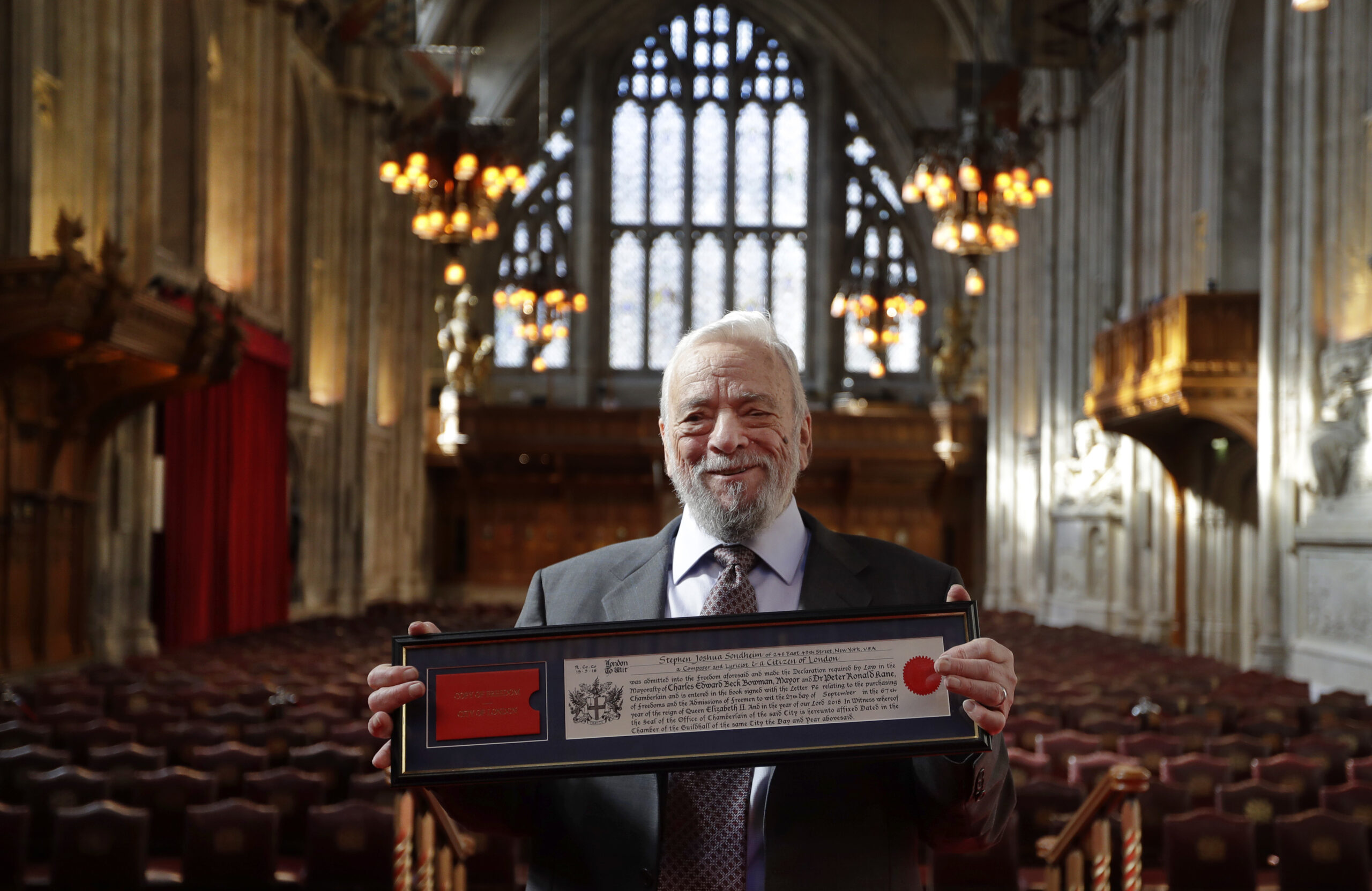The music theater world mourns the death of composer and lyricist Stephen Sondheim, who passed away on Nov. 26 at 91. His 70-year legacy of musical theater masterworks on Broadway earned him a Pulitzer Prize, an Academy Award, eight Tony Awards, and the Presidential Medal of Freedom. A few of his hits include “West Side Story,” “Into the Woods,” and “Company.” WABE music contributor Dr. Scott Stewart joined “City Lights” host Lois Reitzes to pay tribute to the massive influence of a composer whose music redefined stage entertainment and lifted spirits everywhere.
Interview highlights:
Sondheim the artist: “I think one of Sondheim’s greatest distinctions as a composer and a lyricist was his attention to character, and how conversations that we might have at a coffee shop could easily be adapted into musical numbers, which often included a lot of witty and clever, tightly rhymed, chatty lyrics,” said Stewart. “His music was mathematically tricky and full of rhythmic landmines for performers, which is why we love to play it so much. But they were always digging deeper into the hearts of the characters.”
“He grew up in an era of optimistic, escapist, light-hearted, happy-ending musicals, and he steered the entire genre toward serious topics that were grounded in the reality of what it’s like to be a human.”
“Gypsy”: “If you just had to adjust the levels on your speakers, that was because that was Ethel Merman, who is amazing,” said Stewart. “The story goes that Arthur Laurents approached composers Irving Berlin and Cole Porter to score ‘Gypsy,’ but they both declined. So they approached Sondheim, but Ethel Merman, in diva mode, did not want a quote-unquote ‘unknown composer’ on the project…. Sondheim begrudgingly accepted as just the lyricist. As it turns out, ‘Gypsy’ has an uncanny number of Broadway standards that have emerged after the show itself.”
“Company”: “’Company’ was Sondheim’s sixth Broadway musical, but one where the tone was shifting from what in the past had been more light-hearted themes to much more serious, realistic, adult topics. ‘Being Alive’ is the climax to the entire ‘Company’ production, when bachelor Bobby realizes that he needs company. There are two halves to this song – the first, in which he rejects relationships, and the second half, in which he actually yearns for it. You’ll notice this really subtle shift of lyrics; first half, ‘Someone to hold me too close.’ Later in the second half, it says, ‘Please, somebody, hold me too close.’”
“Sweeney Todd”: “This certainly speaks to Sondheim’s range of topics; in this case, a vengeful, murderous barber. ‘Sweeney Todd’ was Sondheim’s tenth Broadway production. It won eight Tony Awards, including Best Musical. It’s considered one of Sondheim’s masterpieces and was adapted into Tim Burton’s 2007 film starring Johnny Depp. Mrs. Lovett, the meat pie store owner, convinces Sweeney Todd that they can mutually benefit from his slaying customers by converting them into, well, pastries.”
“Into the Woods”: “This is a dark take on the intertwining of several fairy tales including ‘Little Red Riding Hood,’ ‘Cinderella,’ ‘Jack in the Beanstalk,’ ‘Rapunzel,’ and a few others, and a baker and his wife who want to start a family…. Outstanding show.”
“West Side Story”: “Sondheim was 27 when ‘West Side Story’ came along. His mentor, Oscar Hammerstein, convinced him to throw his hat in the ring for this show, and it worked out rather well. ‘West Side Story,’ as we all know, is an adaptation of Shakespeare’s ‘Romeo and Juliet,’ but in this case, the star-crossed lovers are members of rival white and Puerto Rican gangs in racially-charged 1950’s New York.”
“Stephen Spielberg has directed the newest installation of ‘West Side Story,’ which is set for release on Dec. 7. The movie is dedicated to Spielberg’s father, Arnold, who passed away in August of 2020 when it was supposed to be released originally. In September of this year, Sondheim appeared on the Late Show with Stephen Colbert and put his stamp of approval on the movie, saying that Spielberg and screenwriter Tony Kushner had ‘nailed it,’” said Stewart.






